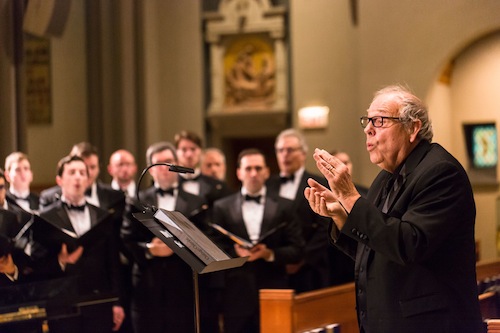Chicago Chorale’s “Sealed Angel” once again touches the soul

What is it about the tradition of Eastern Orthodox sacred music that allows it to touch our souls so deeply?
Perhaps it’s the music’s unwavering allegiance to its ancient roots. Over the centuries Christian sacred music moved on from austere Gregorian chant and found expression in Martin Luther’s tuneful hymns, Bach’s intricately constructed cantatas and Passions and dramatic requiems by the likes of Berlioz and Verdi. Their masterworks are certainly as spiritually intense as the haunting simplicity of Gregorian chant.
But modern composers like Rachmaninoff and Arvo Pärt often chose to operate within the strict confines of ancient Eastern Orthodox tradition—choral voices only, no accompanying instruments, sometimes a male-only chorus. In part, the power of their liturgical-inspired music comes from their virtuoso use of a purposely limited aural palette.
The adventuresome Chicago Chorale has plumbed this rich tradition in recent years, and over the weekend reprised one of its most memorable forays into modern Eastern Orthodox liturgical music—Rodion Shchedrin’s The Sealed Angel: A Russian Liturgy. The chorale presented the nine-part cantata in 2012, and its performance Sunday afternoon in St. Vincent de Paul Parish re-affirmed the magic of Shchedrin’s 1988 work.
Born in 1932, Shchedrin became a prominent composer in the Soviet Union without abandoning his ties to his family’s long-standing Russian Orthodox beliefs. The Sealed Angel is a profound testament of steadfast faith.
Scored for mixed chorus and solo oboe, the hour-long cantata is a treasure house of luminous, darkly hued song. Conducted by artistic director Bruce Tammen, the chorale unfurled long-lined melodies that resonated within the church’s soaring space, lingering in the air like shafts of glowing light. In solo sections, especially, the chorale’s soprano voices offered a gripping combination of crystalline precision and comforting warmth. In the opening and closing sections, the chorale invoked the angel with slow, serene melodic lines, radiating confidence that the angel would be moved by their gentle, persistent prayer. In the cantata’s full-throated moments, the massed voices had both edgy emotion and rock-solid strength.
Some commentators describe the cantata’s solo oboe as Shchedrin’s mysterious angel herself. Under oboist Jana Specht’s deft fingers, however, the oboe seemed much more human. Emerging against the chorale’s soft, unwavering humming, her melodies twirled and twitched. Occasionally dissonant, their short, repetitious phrases conjured images of a solitary, dancing child, utterly immersed in his own, private world
Hyde Park Union Church, where the Chorale performed Saturday night, is a more intimate space than the vast St. Vincent de Paul Parish on DePaul University’s Lincoln Park campus. Doubtless Shchedrin’s cantata was a more personal experience in the smaller space. But St. Vincent de Paul Church is awash in angels, symbols of its namesake’s devotion to the poor. With the chorale framed by two large, hovering angels flanking the church’s main altar, we never lost sight of the central character in Shchedrin’s musical drama.
Posted in Performances




